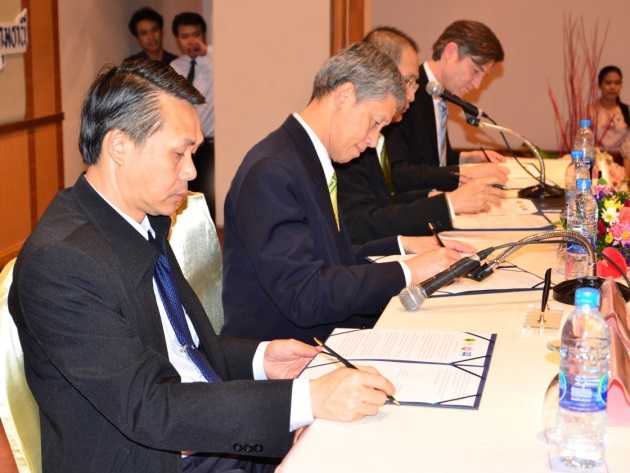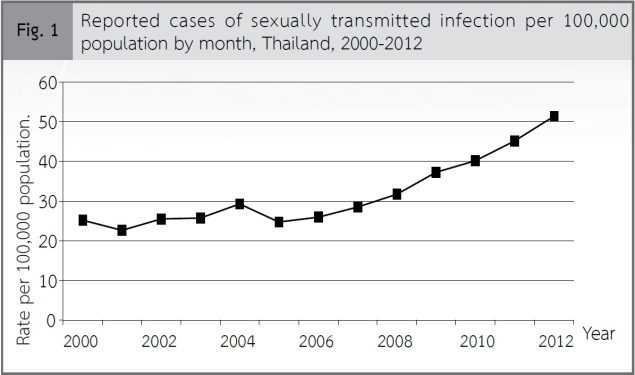Dramatically Increasing Access to High Quality STI and HIV Services for Key Populations in Thailand

A Memorandum of Understanding was signed in 2013 to work together to advocate for continuous quality improvement of services for HIV and sexually transmitted infections.
Left to right: Dr. Thongchai Keratihuttayakorn (Director of the Bureau of Health Administration), Dr. Anuwat Supachutikul (Director of the Healthcare Accreditation Institute of Thailand), Dr. Somsak Akksilp (Deputy Director of the Thailand Department of Disease Control), and Dr. Mitch Wolfe (CDC-Thailand Country Director)
Sexually transmitted infections (STIs) can have tragic consequences for families, including serious illness, infertility, childhood blindness, and premature births. STIs can also contribute to HIV transmission. In the early 1990s, Thailand's strong STI program played a key role in bringing the quickly spreading HIV epidemic under control.
Unfortunately, healthcare reform in the early 2000s eliminated Thailand's dedicated STI clinics and integrated those services into general public health facilities that did not have the same experience and capacity for STI management. During the decade that followed, the number of reported cases of STIs nearly doubled
(see figure 1).

The number of sexually transmitted infection cases nearly doubled in Thailand between 2000 and 2012. Source: Annual Epidemiological Surveillance Report 2012, Bureau of Epidemiology, Thailand Ministry of Public Health (www.boe.moph.go.th/)
Nationwide program launched
In response, CDC through the U.S. President’s Emergency Plan for AIDS Relief’s (PEPFAR) Asia Regional Program worked hand-in-hand with Thailand’s Department of Disease Control (DDC) to strengthen its STI program and the capacity of public health care providers to diagnose and treat STIs.
This close collaboration with the DDC, the Ministry of Public Health (MOPH), and the National Health Security Office (NHSO) made possible the launch of a country-owned, nationwide program to improve STI services in FY 2013, using a quality management system (STIQUAL) developed by CDC-Thailand.
CDC-Thailand then helped plan and negotiate an agreement between the NHSO, which allocates funding for Thailand's public health services, and DDC to provide 10 million Thai baht (about $321,000) per year for three years to improve STI service quality. With that agreement in hand, the DDC and 36 Provincial Health Offices committed to work together to implement the improved STI program – making STI services easier to access and of better quality. Subsequently, the Bureau of Health Administration, the DDC, the Healthcare Accreditation Institute of Thailand, and CDC-Thailand signed a memorandum of understanding to work together to advocate for continuous quality improvement of HIV and STI services for prevention, care, and treatment.
Collaboration leads to better services
As a result, the Thai people can now be tested for STIs for free in 39 provinces around the country, using services that are continuing to improve in quality. Thanks to the success of collaboration between the PEPFAR Asia Regional Program and Thailand, many more STI cases will be caught and treated early, improving the outcomes of STI services – and helping to reduce the number of new HIV infections in the country.
Date: 2014
- Page last reviewed: June 6, 2014
- Page last updated: June 6, 2014
- Content source:


 ShareCompartir
ShareCompartir